Do Mosquito Sprays Kill Bees?
-
Pete Ortiz
- Last updated:
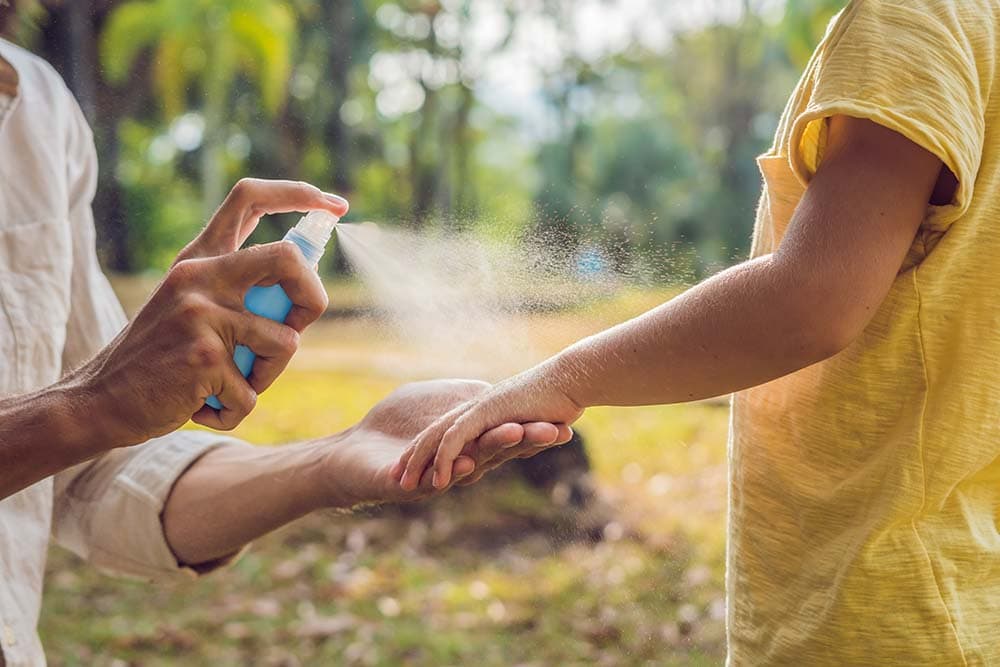
Bees are critical to the full functioning of an ecosystem. They pollinate plants by carrying pollen between plants of different sexes, which helps them reproduce. This directly translates into more food production.
Unfortunately, recent studies have found that the bee population has steadily declined in the last decade. One of the major culprits responsible for this decline is insecticides. This is because most chemicals used to kill harmful bugs, such as mosquitos, also kill bees. The most widely used mosquito sprays are also toxic to native insects and aquatic organisms.
Here’s what you need to know before purchasing bug spray.
Are Mosquito Repellents Safe for Bees?
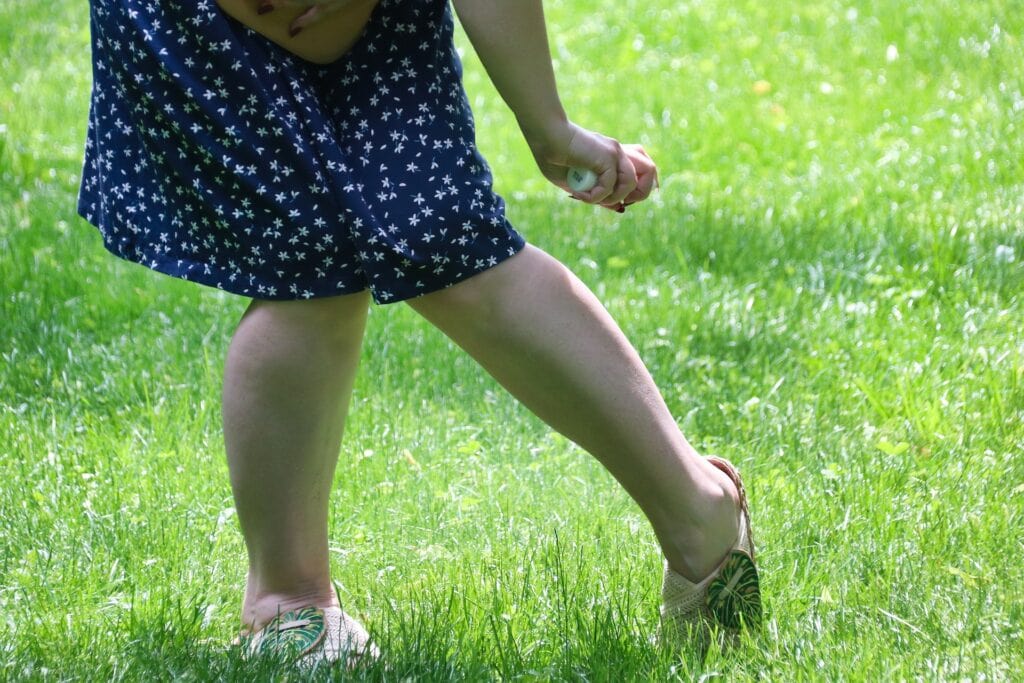
Most mosquito repellant sprays are made using pyrethrin, a chemical derived from chrysanthemum flowers that is toxic to birds, insects, and pets. There’s simply no way for you to use these insecticides in your home and compound without killing other insects such as butterflies, ladybugs, and dragonflies.
Even if the insecticide does not end up killing the bees, it can disorient them and prevent them from functioning normally. One study found that even as little as 0.009 micrograms of pyrethrin per bee can confuse them and deter them from returning to the hive. With the declining bee population worldwide, we cannot afford to continue killing them.
Is DEET Harmful to Honey Bees?
DEET is the most common insecticide used in controlling mosquitos, so it is expected that people are concerned about the impact it might have on bees. While it causes some mild effects on bees, it does not kill them. It simply disrupts their receptors and affects their heat and smell sensors.
It has less pyrethrin than most insecticides on the market and is on the environmentally approved list. However, the concentration may defer from insecticide to insecticide so ensure you read product concentration on the label.
Low Impact Pesticides

You can still control mosquitoes by using low-impact pesticides. Just choose insecticides with low toxicity levels, preferably those with chemicals that break down faster after application. They tend to have minimal effect on pollinators and other insects. Some low-impact pesticides include:
- Insecticidal soaps: Are diluted in water and sprayed on plants and furniture surfaces to deter bugs and mosquitos from climbing on them. Most insecticidal soaps are made from potassium salts and work by breaking down fatty acids in the insect’s body. They do not affect most pollinators, especially if the concentration of the salts is low.
- Bio-pesticides: Microbial pesticides are made from fungi or bacteria which are naturally occurring. They vary in their toxicity to bees and other insects. Most have low toxicity levels and are only toxic to mosquitos while having minimal effect on bees.
How to Get Rid of Mosquitoes Without Killing Bees
Hanging out in your backyard is quite enjoyable, especially when you don’t have to swat mosquitoes simultaneously. That’s the main reason why most people opt to spray insecticides. However, not all of them are eco-friendly.
Before you get insecticides or a pest control company, you need to ensure that they will not kill other pollinators in your backyard. Keep in mind that if the pollinators don’t survive, the plants in your backyard may produce a lower yield. Luckily, there are several ways you can get rid of mosquitoes without killing the bees.
1. Drain Stagnant Water
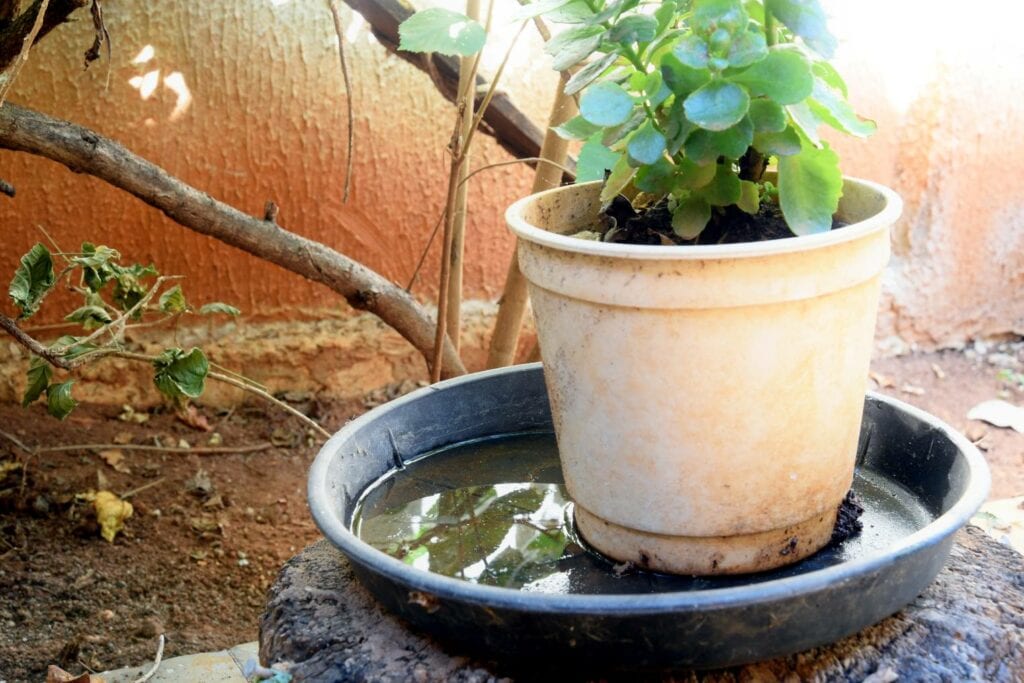
Stagnant water is the main breeding ground for female mosquitos. They cannot reproduce if there is no place for the larvae to hatch. So, one of the most effective ways of getting rid of mosquitos in your compound is by removing anything that can hold water, such as empty buckets, birdbaths, tarps, and gutters.
Simply draining the water once a week can make a big difference without killing other insects. However, if you still want to keep water out for birds and bees, you can replace the water in the containers every two days.
2. Plant Natural Deterrents
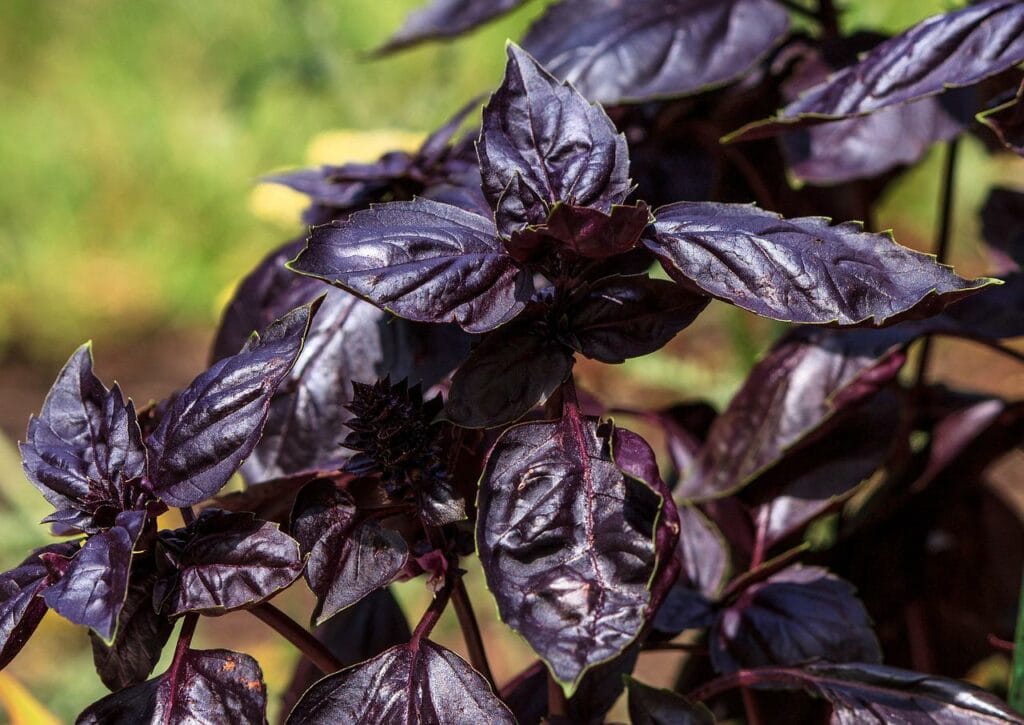
Some plants act as natural mosquito deterrents, and you can place them strategically in the yard to repel mosquitos and other bugs. Nurturing these plants creates a more hospitable environment and adds color to your yard.
Some plants that naturally deter mosquitoes include marigold, mint, citronella, and basil. The best plants are those that are native to your region. If you are unsure how to plant them, consider consulting with a landscaper.
3. Attract Natural Predators to Your Compound
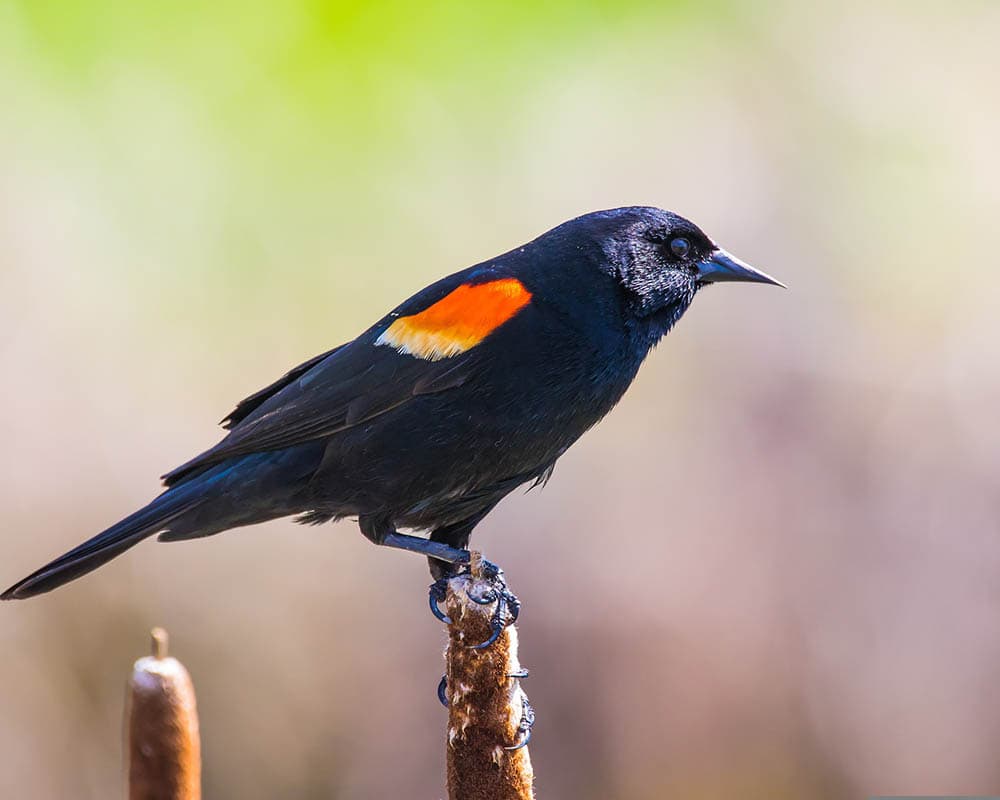
You can encourage birds and insects that eat mosquitoes by putting bird boxes and baths in your compound. Some birds that eat mosquitoes and can be found in most home gardens include tree swallows, eastern bluebirds, and pigeons.
Most of these birds are not people-shy and tend to congregate where people are. The best part is building suitable boxes and nests for them requires very little maintenance, and it’s an effective way to control mosquitos all year round. However, it is understandable if you don’t want birds in your home due to ornithophobia or because of the damage most birds cause to fruit trees.
4. Use Garlic Cloves
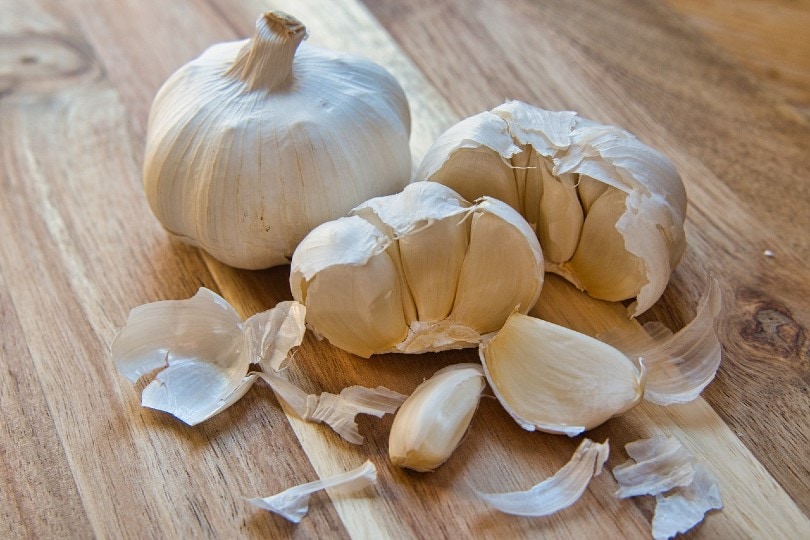
In recent years people have been using garlic cloves to deter mosquitoes from entering their houses. Peel a few cloves, crush them and place them on windows and doorways. In a study conducted in India, people use crushed garlic mixed with petroleum jelly as a mosquito repellent. Other studies prove that eating foods with a lot of garlic may ward off mosquitos.
Garlic also destroys certain species of mosquito larvae. To deter mosquitoes from breeding, you can treat stagnant water with garlic cloves and sulfur.
5. Consult With a Pest Control Company
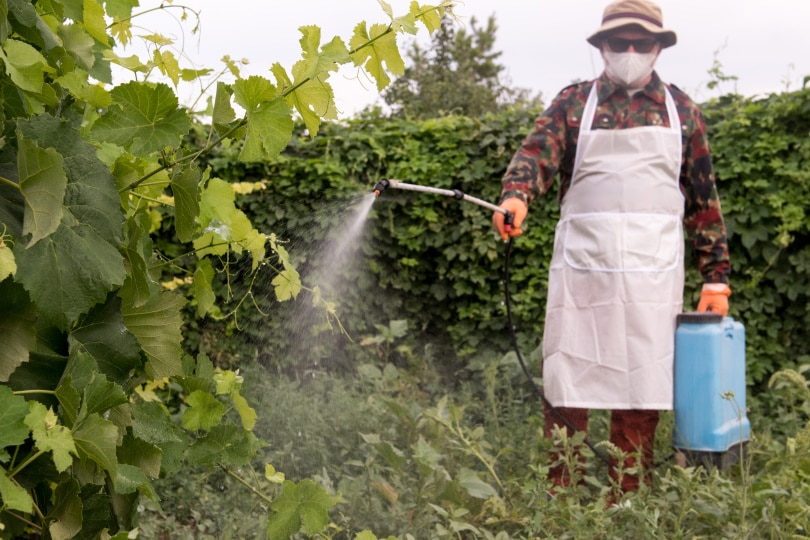
If you have a severe mosquito problem that won’t disappear even after trying the techniques above, consider getting professional pest controllers. They know the best pesticides to use to eradicate mosquitoes with low or zero pyrethrum.
Some companies use a mixture of essential oil that repel mosquitos and prevent them from coming to your yard. The most common oils include neem oil, peppermint, and lavender. You should, however, note that some of the environmentally friendly methods they claim to use may cause some harm to natural pollinators as well. Therefore, ensure you do your research before choosing the method to use.
Controlling Mosquitoes With the Least Effect on Bees
A decline in bee population means a decrease in food production since most plants rely on them for pollination. While bees are a bit scary to have in your yard, they will not usually bother you unless you bother them first. Therefore, they do more good than bad by being in your backyard.
Mosquitos, on the other hand, are pretty irritating. They are also disease vectors and can spread malaria and zika virus, which are deadly diseases. This is why controlling mosquitoes should be a top priority. However, ensure you do so without killing the bees in your compound and the neighbor’s compound. The tips in this article should help you do that.
Featured Image Credit: Elizaveta Galitckaia, Shutterstock
Contents



